East Oakland high school students learn about sustainable urban design during visit to Northeastern campus
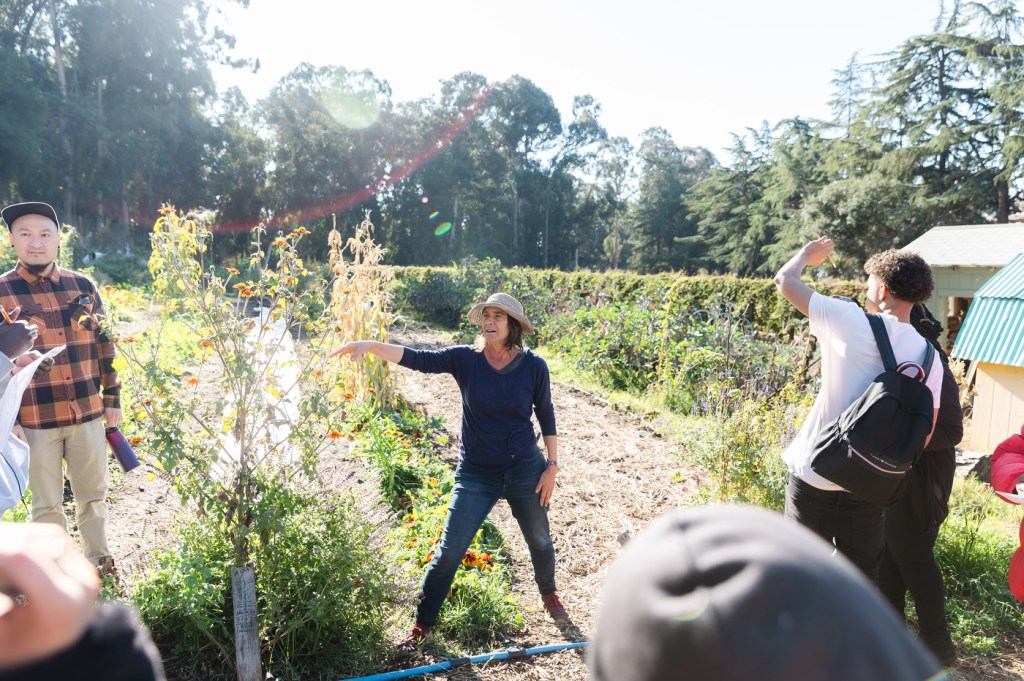
OAKLAND, Calif. — Northeastern’s Oakland campus has been described in many ways: green, lush, stately. But the word that comes up most often is “oasis.”
And there’s no more vibrant or fertile spot on campus than the university’s Community Farm, a 2.5-acre hillside of fruit trees, vegetables, herbs and flowers that sits at the front gate of campus.
Students at Castlemont High School in East Oakland also know a thing or two about urban farming. They built their own oasis — a 1-plus acre organic garden with multiple greenhouses, outdoor kitchen and a recently erected chicken coop — on land that used to be a vacant lot a decade ago and now connects to their campus.
Last week, 28 sophomores from the Sustainable Urban Design Academy at Castlemont High toured Northeastern’s farm, campus and cafeteria. The daylong field trip included discussions with Northeastern faculty and staff about the importance of sustainable urban design, food systems and ecological justice.
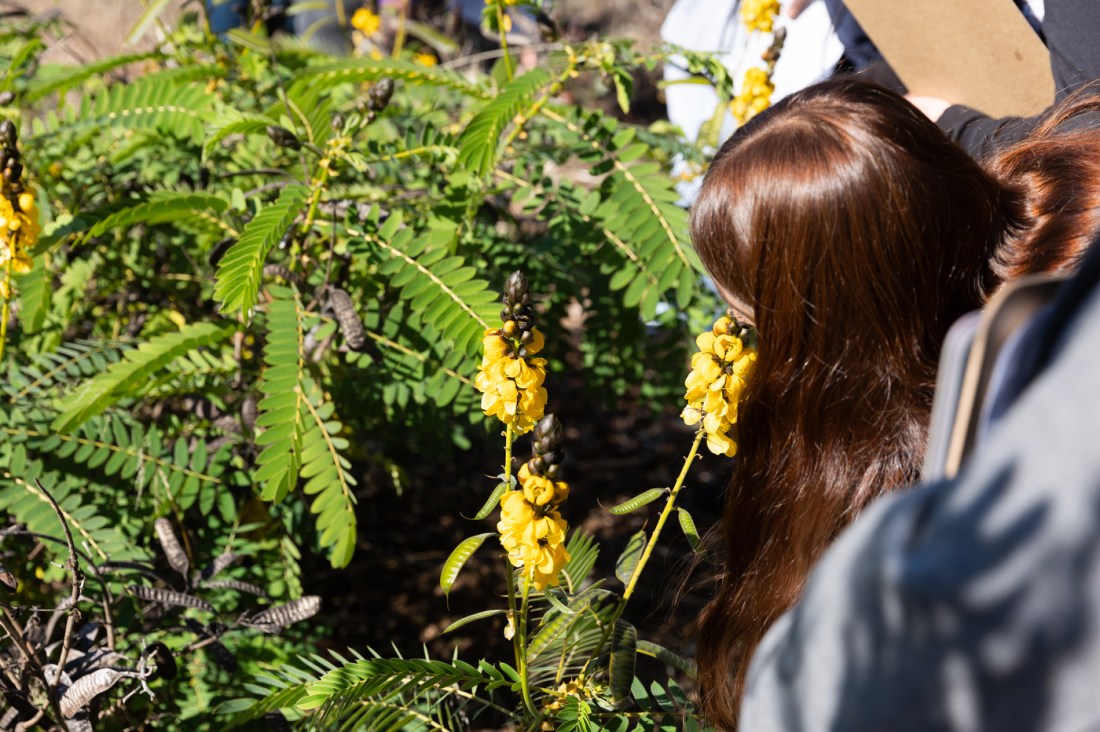
“These intrepid, wise and thoughtful scholars from Castlemont asked critical questions about our food systems and sustainability practices as they work to build an urban farm-to-fork food system at their own school,” said Cliff Lee, professor of Art, Design and Education at Northeastern, who helped organize the event.
The East Oakland high school students are modeling the principles of experiential learning that the university prides itself on, said Lee, a Northeastern Community to Community (C2C) Seed Grant recipient.
And it was a beautiful day to be on the farm.
“The students, when they saw the garden, they were like, ‘wow, this is beautiful,’” said Aparna Rao, a teacher at Castlemont’s Sustainable Urban Design Academy. “I hope that by visiting the beautiful and vibrant farm at Northeastern, the students will see the power of local sustainable farms and the potential for collaboration between them in Oakland.”
On the farm tour, Rao held up rosemary for one of the students to smell.
The sophomore closed her eyes and inhaled.
“Mmmm, that smells good,” she said, smiling.
Beneath her straw hat, gardening shears holstered at her hip, Community Farm manager Julia Dashe greeted each student with a hearty “good morning!” and prompted them to explore what was in the garden.
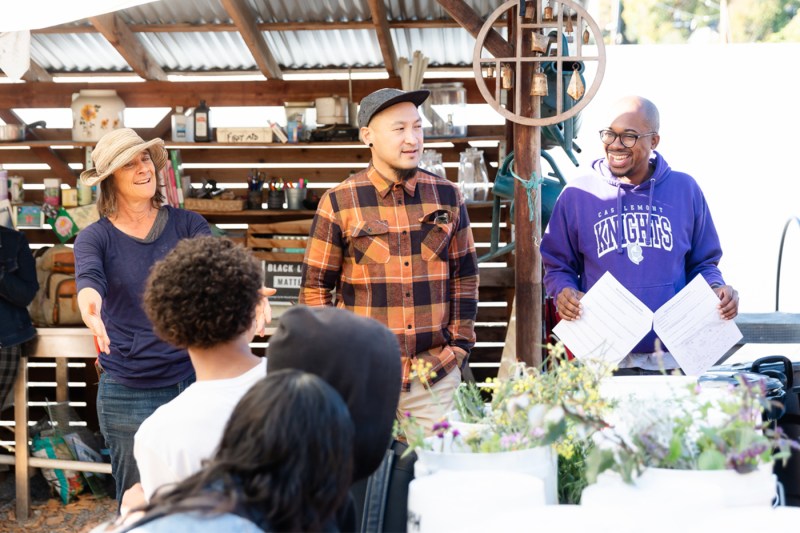
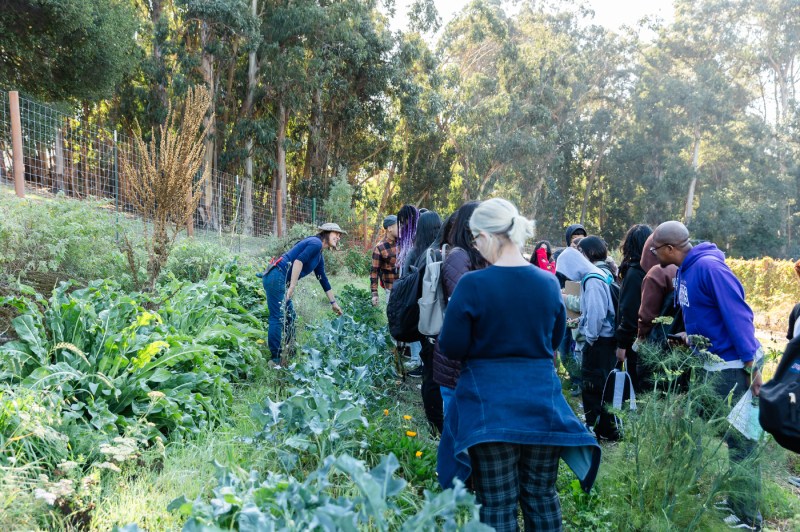
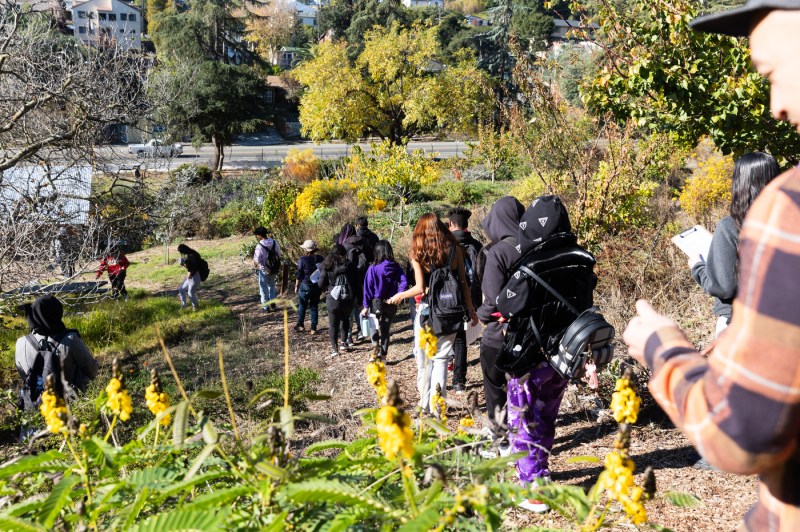
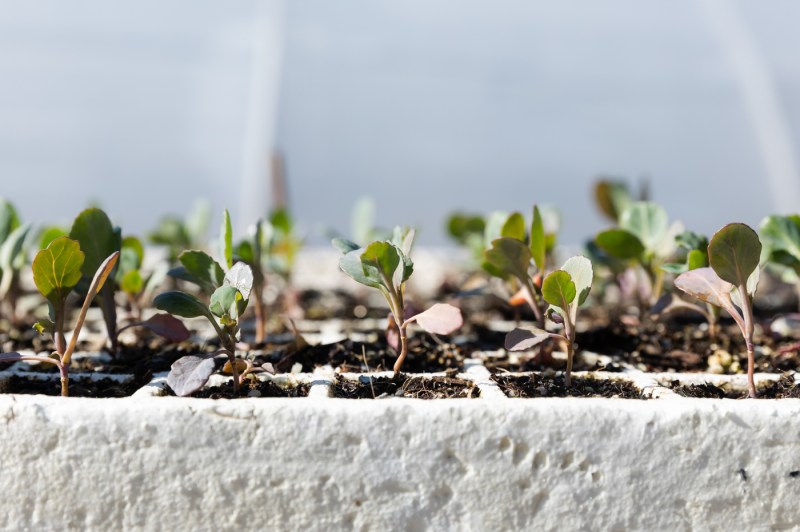
Dashe pointed to a bush with small orange bulbs sprouting from leafy branches.
“What are these?” she asked the students.
One student volunteered that they could be fruit.
“They’re rosehips!” Dashe exclaimed, advising the students that the seed-filled bulbs that grow at the base of a rose are good for jams and teas, and have a lot of vitamin C.
At the end of the tour, the students gathered at the wooden picnic tables for a question-and-answer session with Dashe, who has been managing school and community farms in California and New England for nearly two decades. The students had a list of prepared questions that Marvin Boomer, the Linked Learning Pathways Coach at Castlemont’s Sustainable Urban Design Academy, made sure they brought and filled out.
The students were on a mission to cull as much information as possible in order to bring more ideas back to Castlemont.
Boomer, coach of the program for three years and wearing a purple Castlemont sweatshirt with his name emblazoned on the back, encouraged the students to speak up.
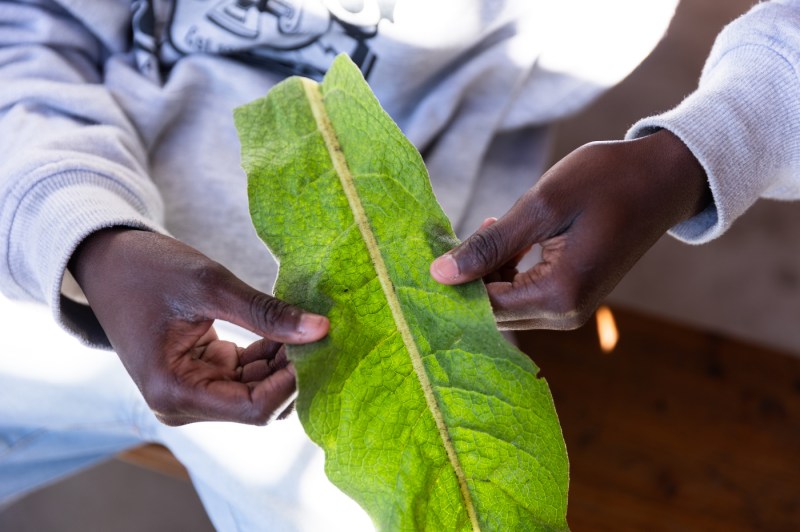
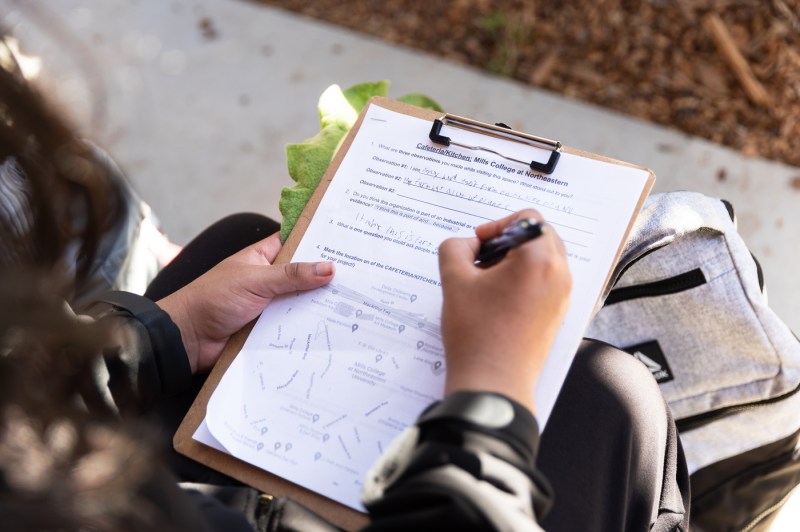
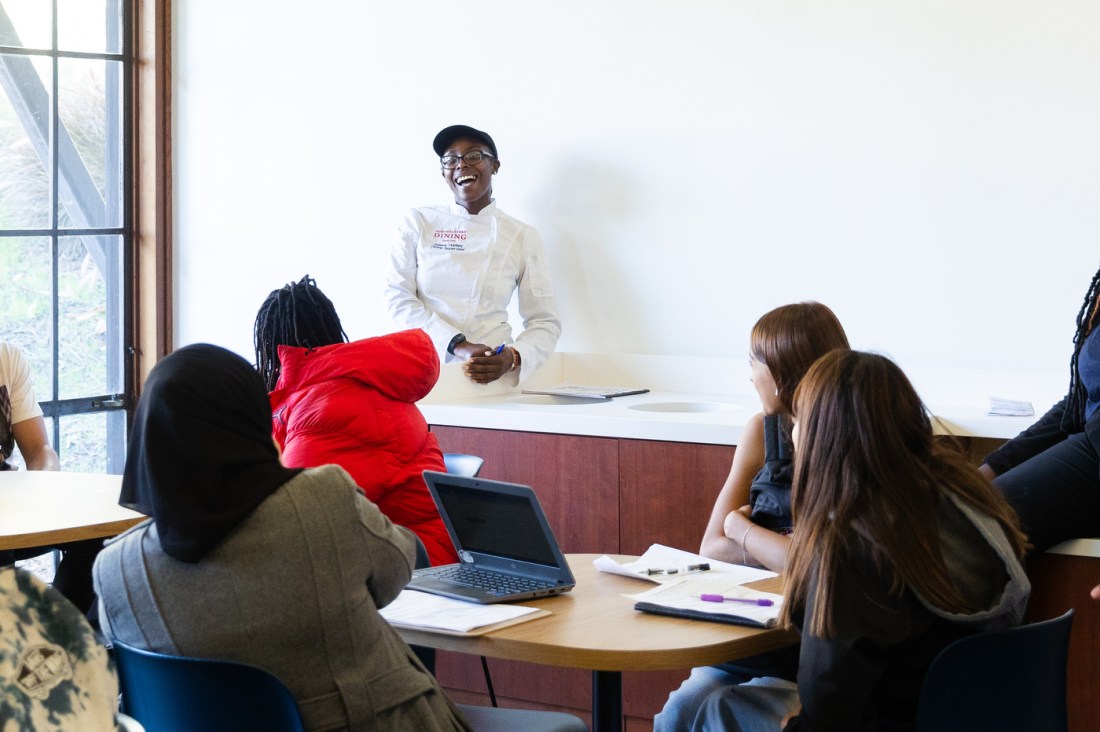
One student asked about safety protocols, and how Dashe makes sure the produce is safe to eat. Dashe asked the student, an experienced urban farmer herself after all, what she thought was most important.
“Washing it?” the student asked shyly.
“Yes!” Dashe said, explaining that although dirt can be harmless, it exposes people to bacteria, parasites and toxic heavy metals. “I love dirt, but I don’t want to eat it,” she said.
Lee mentioned the importance of honoring farming practices from Indigenous people, pointing out that the urban farms themselves were planted on land of the native Ohlone people. He referenced controlled burns, a practice used to combat wildfires in the area that is as old as the Ohlone people, and the people before them.
“Many of the things we learned today we learned from the indigenous people who came before us,” Lee said.
Dashe agreed that farming techniques, like planting particular plants and flowers to attract butterfly and hummingbird pollinators, draw from native practices, and from the students’ ancestral traditions. Castlemont High School is made up of a diverse student population of Latinx, Black, Native Hawaiian and Pacific Islanders, among others.
“We all have connections to the land,” Dashe said. “We should think about that and honor people who work the land, often for not-good wages.”
The students, who Rao said recently watched “Food Inc.,” a 2008 documentary examining the effects of corporate farming on food quality, the environment, land, animals, farmers and workers, talked about the difference between industrial and sustainable food.
The students went on to eat lunch at Founders Commons, the student dining hall on campus, where they met Selena Huntley, the dining room supervisor. Huntley happened to be a Castlemont High graduate.
“Part of the purpose of visiting Northeastern University is for the students to see an example of a cafeteria system that is sustainable and responsive to student needs,” Rao said. “The students can have it as a model for a project they are working on to come up with some improvements to their own school cafeteria.”
Oakland has seven urban farms, and programs like Castlemont’s aim to spread the idea that growing food is not only tastier, but innately human. It’s a special thing for the students, but Boomer maintains that it shouldn’t be a special privilege, but a human right.
“The only thing that has made ‘urban’ farming different is that people have to be creative about getting access to land,” Boomer said. “This ‘urban’ farming’ is a response to institutional and systemic barriers that have made it so that growing food is not the norm for many people in Oakland.”
Boomer said Castlemont’s farm has been a place of connection and healing for the students and East Oakland community. They recently hosted a Harvest Festival, eating a meal made from their summer and fall harvests, and regularly erect farm stands, giving fresh produce out to Oaklanders for free.
Such community connections are vital, and the work requires just as much vigilant care as the food in the soil.
“I hope the students got to see themselves as important, deserving, and capable of making a difference in their communities and for the planet,” Rao said.
Dashe offered each student a sprig of mint on their way out.
“Put it in water, root it out and plant it at home,” she said.
For media inquiries, please contact media@northeastern.edu.






